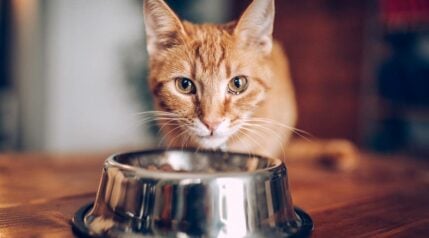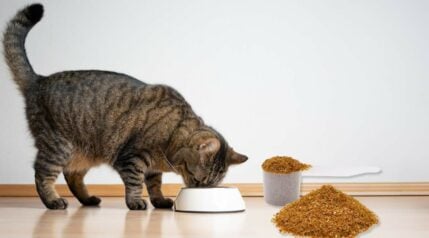When you purchase through links on our site, we may earn a commission. Here’s how it works.
Sunflower seeds are a salty snack and tasty topper for many health-conscious humans. But are these crunchy kernels safe to share with your feline friends? Can cats eat sunflower seeds?
Cats are obligate carnivores, meaning they depend on animal meat as their primary source of nutrients. Also called hypercarnivores, obligate carnivores cannot properly digest plant-based foods and can’t survive on plants alone.
Still, not all plant-based foods are no-nos, and if you’ve found this article, you’re probably wondering about feeding your cat sunflower seeds. Cats can eat sunflower seeds, but there are a few things you need to know before letting your cat chow down on them. We discuss which sunflower seeds are safe for cats to eat.
What Are Sunflower Seeds?
As their name suggests, sunflower seeds come from the sunflower plant. Sunflower seeds are harvested from the plant’s flower head, which consists of 1,000 to 2,000 seeds per flowering head.
Sunflower seeds are popular in trail mix, multi-grain bread, and nutrition bars. You can find them sprinkled on salads or eaten by the bagful. They also made a tasty treat for your neighborhood birds.
Can Cats Eat Sunflower Seeds?
According to the American Society for the Prevention of Cruelty to Animals (ASPCA), the sunflower plant is not toxic to cats. Cats can eat any part of the sunflower plant, including the seeds.
While sunflower seeds are safe to ingest, it’s best to discard the hard outer shell before feeding sunflower seeds to your cat. The sunflower seed’s hull is hard for a cat to digest and can cause internal injuries while moving through the digestive tract. It’s best only to feed your kitty the sunflower kernel, which can be seen once the hull is removed.
Confirm that the sunflower seeds are unsalted and unflavored to prevent digestive problems for your feline. Start with only one or two kernels and wait 24 hours to confirm that your cat isn’t allergic to sunflower seeds. If no problems arise, you can feed your cat sunflower seeds in moderation.
Health Benefits Of Sunflower Seeds
Sunflower seeds are chock full of nutrients, and while your kitty will get the most bioavailable nutrients from animal products, they may still benefit from the occasional sunflower seed.
According to the U.S. Department of Agriculture (USDA), 1/4 cup of dried sunflower seed kernels contains:
- Calories: 204.5
- Protein: 7.3 grams
- Fat: 18 grams
- Carbohydrates: 7 grams
- Fiber: 3 grams
Sunflower seeds are not only high in protein and healthy fat, but they also contain a variety of vitamins and minerals. Sunflower seeds are an excellent source of vitamin E, vitamin B1, vitamin B6, iron, potassium, selenium, copper, and zinc.
Health Benefits Of Sunflower Seeds For Cats

If provided moderately, sunflower seeds can support your cat’s digestive system, thanks to the high-fiber content of this seed. Ensure the shells are removed and the seeds are free from salt, added oil, or any other seasoning. Remember, moderation is key. Because of their high fat content, too many sunflower seeds can potentially upset your cat’s stomach, leading to diarrhea and vomiting.
Other health benefits of sunflower seeds include:
- Immune Support: The vitamin E, zinc, and selenium in sunflower seeds all enhance immunity. Vitamin E boosts immune responses and is an antioxidant that prevents free radical damage in the body. Zinc wards off invading pathogens, and selenium reduces inflammation and enhances immunity.
- Cardiovascular Support: The magnesium, potassium, and fiber in sunflower seeds offer overall cardiovascular support and help lower blood pressure and cholesterol levels.
- Energy Support: Sunflower seeds contain B vitamins essential for cellular energy.
- Skin Support: The fatty acids in sunflower seeds help formulate collagen and elastin. The antifungal and antibacterial properties of these seeds can help prevent skin infections.
Sunflower seeds also offer anti-inflammatory benefits that can be crucial in preventing various diseases, including cancer, type 2 diabetes, neurological disorders, and metabolic syndrome. According to a 2017 review published in Chemistry Central Journal, sprouted sunflower seeds offer extra antioxidant benefits than dry roasted varieties.
How Many Sunflower Seeds Can My Cat Eat?
Ideally, your fur baby should only have between one and five of the seeds at a time. They should be had every day. Remember, these are calorie-dense, and you don’t want your kitty to gain unhealthy weight. If your cat is already a little chunky, sunflower seeds should only be a very occasional treat. The majority of your kitty’s nutrition needs to come from balanced cat food.
As any pet parent knows, it’s crucial to be aware of potential health hazards in your home, especially when living with a curious kitty. If you have a cat that’s extra invested in what you’re eating, knowing what foods are toxic to felines can save you the cost of an emergency vet visit. Even though sunflower seeds are safe in moderation, your pet is sure to encounter unexpected dangers throughout its life. Pet insurance can reduce the financial burden of unexpected vet visits so you can focus on your cat’s health in an emergency.
Can Cats Eat Sunflower Oil?
Yes, cats can eat sunflower oil. Sunflower oil is a source of omega-6 fatty acids to help maintain healthy skin and coat. While sunflower oil provides fatty acids, it lacks arachidonic acid (AA), an omega-6 found exclusively in animal fats, and thus is not a quality stand-alone source of fat for felines. Talk with your vet to determine the right amount of sunflower oil for your cat.
It should be noted that sunflower oil is a concentrated source of fat, which can lead to weight gain and other health problems—such as diabetes—if given to your cat too regularly. Excessive oil can also cause digestive problems and diarrhea. Your cat may get full quicker by consuming calorie-dense sunflower oil, causing them to eat less and miss out on the nutrients in their regular food.
Consider using fish oil to supplement your cat’s diet with quality fats. We love Nordic Naturals Omega-3 Cat, made from wild anchovies and sardines. Omega-3 fatty acids support your cat’s brain, eyes, heart, skin, coat, joints, and immune system. This formula is third-party tested for purity, and the company provides a certificate of analysis for each product.
Frequently Asked Questions
Below, I cover a few of the most common questions about cats eating sunflower seeds. If I didn’t get to yours, let me know in the comments.
Do Cats Like Sunflower Seeds?
More often than not, cats go crazy for sunflower seeds. Cats need high amounts of protein and fat, so it’s reasonable that your cat would be attracted to this high-protein, high-fat seed. A cat’s flavor preferences can differ, so you’ll have to offer it to your cat for a definitive answer.
When Is It Bad To Feed Your Cat Sunflower Seeds?
Sunflower seeds are packed with healthy fat, but if your kitty is already on the chunky side, it may be best to limit extra fats. Always confirm you are buying sunflower seeds that are packaged without added flavoring, oils, and salt that could harm your feline.
Can Cats Eat Sunflower Seed Shells?
No, your cat shouldn’t eat the shell of sunflower seeds. The shell could cause an intestinal blockage. If your cat consumes sunflower seed shells, contact your veterinarian.
Can Cats Eat Sprouted Sunflower Seeds?
Yes, it is safe for cats to eat sprouted sunflower seeds. Many companies sell sprouted sunflower seeds for those wanting all the benefits of sunflower seeds without causing digestive issues. When a seed germinates, it creates enzymes that break down carbohydrates into smaller molecules that are easier to digest. You may find that your cat struggles to digest regular sunflower seeds but has no trouble with sprouted, raw sunflower seeds.
Are Sunflowers Toxic To Cats?
The ASPCA says the whole sunflower is safe around cats. Feel free to plant sunflowers in your garden or keep a vase of this sunshine plant on your dining room table.
Alternative Snacks For Cats
Sunflower seeds are safe to feed your cat in moderation, but there are plenty of other healthy treats to consider. Felines love and crave the taste of meat, so consider freeze-dried or fresh foods. When prepared properly, your kitty can have beef, chicken, turkey, and even shrimp. Learn more about what snacks you can safely share with your kitty in our overview of common human foods cats can eat.
Why Trust Love Your Cat?
Tara’s goal at Love Your Cat is to give readers the information they need to raise well-adjusted, happy felines. Like most cat parents, she has occasionally sneaked her kitties a bit of human food, which is why it’s crucial for us humans to know which foods are safe for our furry friends. Tara has extensive experience with felines and nutrition. She has lived with cats for 20+ years and has worked as a health expert at a health food store catering to pets for 7+ years. She spends countless hours researching each topic to provide thorough, up-to-date information on each topic.





